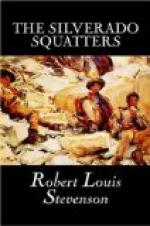The next morning he returned and, as he was this time alone, he bestowed his conversation upon us with great liberality. He prided himself on his intelligence; asked us if we knew the school ma’am. He didn’t think much of her, anyway. He had tried her, he had. He had put a question to her. If a tree a hundred feet high were to fall a foot a day, how long would it take to fall right down? She had not been able to solve the problem. “She don’t know nothing,” he opined. He told us how a friend of his kept a school with a revolver, and chuckled mightily over that; his friend could teach school, he could. All the time he kept chewing gum and spitting. He would stand a while looking down; and then he would toss back his shock of hair, and laugh hoarsely, and spit, and bring forward a new subject. A man, he told us, who bore a grudge against him, had poisoned his dog. “That was a low thing for a man to do now, wasn’t it? It wasn’t like a man, that, nohow. But I got even with him: I pisoned his dog.” His clumsy utterance, his rude embarrassed manner, set a fresh value on the stupidity of his remarks. I do not think I ever appreciated the meaning of two words until I knew Irvine—the verb, loaf, and the noun, oaf; between them, they complete his portrait. He could lounge, and wriggle, and rub himself against the wall, and grin, and be more in everybody’s way than any other two people that I ever set my eyes on. Nothing that he did became him; and yet you were conscious that he was one of your own race, that his mind was cumbrously at work, revolving the problem of existence like a quid of gum, and in his own cloudy manner enjoying life, and passing judgment on his fellows. Above all things, he was delighted with himself. You would not have thought it, from his uneasy manners and troubled, struggling utterance; but he loved himself to the marrow, and was happy and proud like a peacock on a rail.
His self-esteem was, indeed, the one joint in his harness. He could be got to work, and even kept at work, by flattery. As long as my wife stood over him, crying out how strong he was, so long exactly he would stick to the matter in hand; and the moment she turned her back, or ceased to praise him, he would stop. His physical strength was wonderful; and to have a woman stand by and admire his achievements, warmed his heart like sunshine. Yet he was as cowardly as he was powerful, and felt no shame in owning to the weakness. Something was once wanted from the crazy platform over the shaft, and he at once refused to venture there—“did not like,” as he said, “foolen’ round them kind o’ places,” and let my wife go instead of him, looking on with a grin. Vanity, where it rules, is usually more heroic: but Irvine steadily approved himself, and expected others to approve him; rather looked down upon my wife, and decidedly expected her to look up to him, on the strength of his superior prudence.




